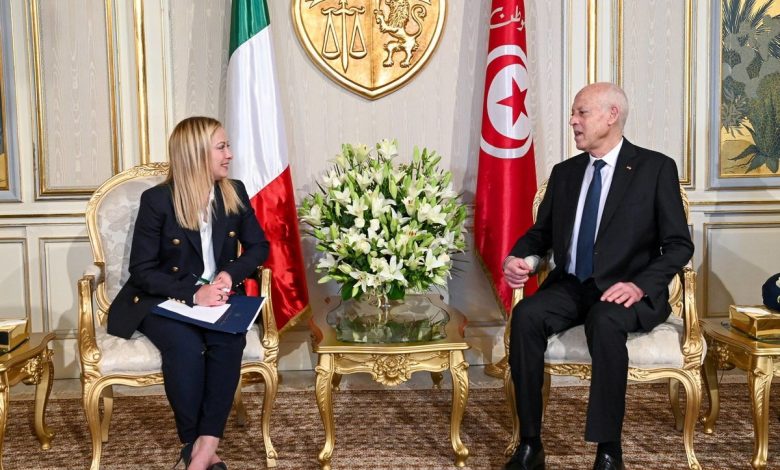A European delegation returns to Tunisia to accelerate the migration control agreement

The Italian Foreign Minister announces that the memorandum of understanding between the European Commission and Tunisia will be signed, emphasizing the importance of the efforts led by Rome to achieve this result.
The European delegation, consisting of the President of the European Commission, Ursula von der Leyen, the Italian Prime Minister, Giorgia Meloni, and her Dutch counterpart, Mark Rutte, is returning to Tunisia today, Sunday, with the aim of negotiating with President Kais Saied regarding the memorandum of understanding, after the Tunisian authorities recently requested a deadline for signing the agreement.
Italian Foreign Minister Antonio Tajani said on Friday, “On Sunday, an agreement will be signed between the European Commission and Tunisia as part of a support initiative by the European Union,” according to the Italian news agency “AKI.”
Tajani added that this step is a culmination of Rome’s efforts, stating that his country has made significant efforts to reach consensus solutions between the European side and the Tunisian authorities, saying, “The agreement in its final form is a text agreed upon by everyone, so we are moving in the right direction and we can achieve the goal that Italy has worked diligently with its entire government to achieve.”
He revealed that the protocol is a “financial commitment” that falls within the European strategy, which will enable Tunisia to face the necessary reforms in a smoother manner, to become a leader in combating human trafficking and be able to grow and have a less complicated situation than the current one.”
During their visit to Tunisia on June 11th, the European delegation presented a partnership offer to the North African country, including financial assistance exceeding one billion euros, in addition to around 150 million euros to be immediately disbursed to the Tunisian budget, as well as enhancing economic and trade relations and cooperation in the field of clean energy.
The agreement aims to curb the flow of migrants from Tunisia to European shores, combat smugglers, and facilitate the return of some Tunisians who are illegally present in Europe to Tunisia.
Deputy President of the European Commission, Margarítis Schinás, said on Friday that “Rome played a central role in reaching an agreement with Tunisia, and we are grateful to them,” according to the Italian news agency “Nova.”
Rome has been leading international efforts to urge its European partners to provide financial support to Tunisia to help it face its economic crisis, driven by fears of a collapse that could lead to a further influx of migrants from Tunisia to its shores.
European assistance is linked to stalled negotiations between the International Monetary Fund and Tunisia for a conditional loan of two billion dollars, while Tunisian Foreign Minister Nabil Ammar affirmed a week ago that it is not possible to obtain a loan of this kind.
For his part, President Kais Saied has repeatedly emphasized his complete rejection of the International Monetary Fund’s condition regarding the reduction of subsidies for essential commodities, considering the social peace in Tunisia as a red line.
European countries have reduced their pressure on Tunisia to push it to expedite its agreement with the International Monetary Fund, while the Tunisian authorities are preparing to announce new proposals to be presented to the international donor side, as revealed by a government official recently.
Tunisia regularly witnesses migration attempts by individuals, most of whom come from Sub-Saharan African countries, towards Europe. Most of these individuals use the maritime route from the Tunisian coasts to the Italian island of Lampedusa, taking advantage of the short distance, which does not exceed 150 kilometers at some points, between Tunisia and Lampedusa.
The latest data from the Italian Ministry of the Interior reveals the arrival of a total of 34,761 people to Italy by boats departing from the Tunisian coasts from the beginning of the year until July 4th.
President Kais Saied, who refuses to turn Tunisia into a border guard or a camp for migrants, adheres to his approach to combating illegal migration, which is based on the need for a new approach, emphasizing that “the solution cannot be limited to traditional security aspects, which have proven their limits,” and calling for “eliminating the causes of this phenomenon.












